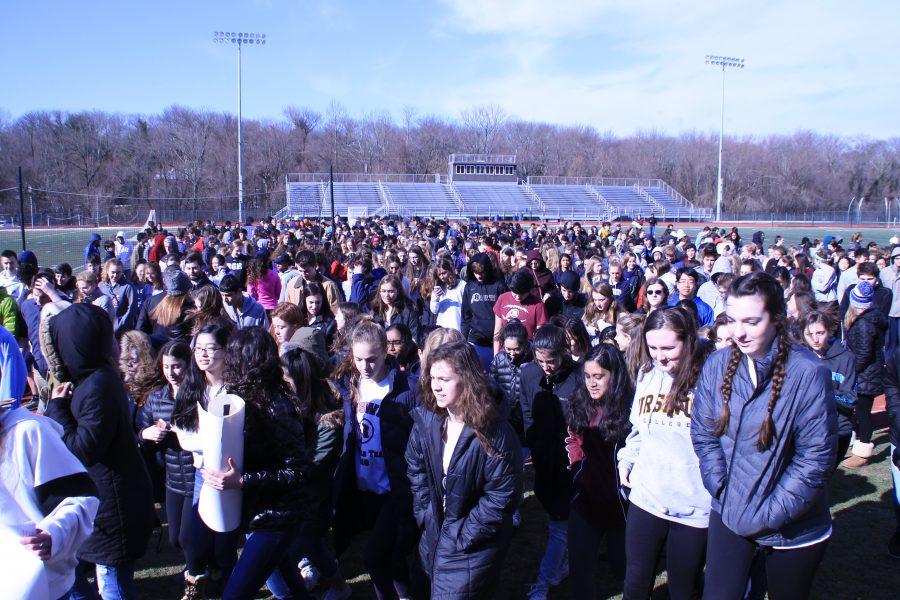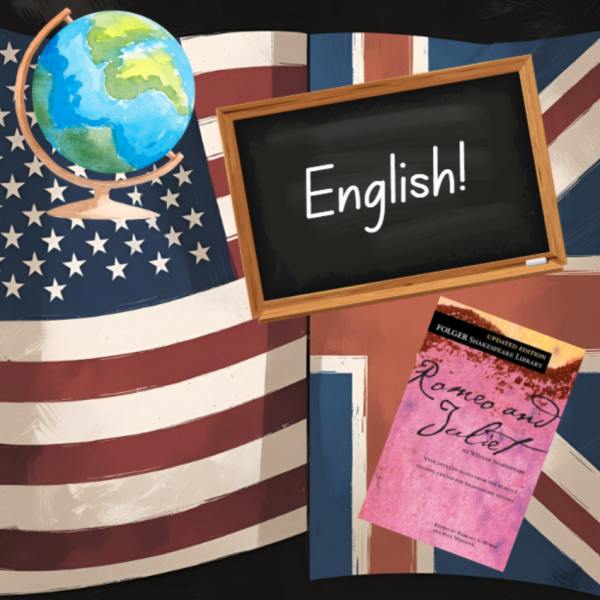March 14th: A Firsthand Account
April 6, 2018
The teacher is in the middle of explaining our assignment when 9:54 turns to 9:55 on the clock positioned on the wall above his head.
“I think we are supposed to leave,” one student interrupts quietly, looking at the teacher meekly.
“Well, I can’t tell you to leave or stay,” the teacher replies, but gestures with his hand for the students who want to protest to leave. About three-quarters of my peers and I stand up, and the students left in the classroom look to the floor to avoid eye contact with those poised to participate in the walkout.
We exit the health room and make our way towards the gym. I’m glad I’m with my friends. People were talking about how they weren’t going to walk out if they were in a class without any friends or if they had a test.
The noise is mostly focused on how “awesome” it is to be cutting class and how cold it will be outside. We turn to head down the band hallway and then swerve to make our way around the gym’s perimeter. We are suddenly met with a huge surge of bodies — all of the people who had classes on the first floor and are taking the quickest route outside. I smile eagerly at the huge swarm of people. The noise is energizing, especially in this tight space. Voices bounce around the beige walls and echo around me. Everyone is talking about the same topics: how great it was to escape that math class and how they forgot their jacket.
I am one of those people who forgot a jacket, and sure enough, it really is freezing out here. I walk down the narrow yellow bleachers with my friends. The steps creak as they overflow with anxious students heading to the football field. Soon everyone is huddled in a tight ball. I wander for a little, trying to find my group of friends who I previously agreed to meet up with.
As I continue to wander, I notice a small semicircle repelling the crowd. Everyone at the edge of the semicircle, part of the larger crowd, has their phones out, all on Snapchat, taking videos.
I realize what they are videoing. A group of upperclassmen, all with slightly familiar faces, are giggling with each other and tentatively holding posters. Clearly they all made these posters together: it’s the same paper, the same markers, the same distinct handwriting. They are powerful posters with powerful messages. There are so few that I read every poster in a matter of 30 seconds. From my perspective, the posters and their holders are one side of a magnet and the larger, less active crowd is the other. Each side draws the same magnetic strength from each other, but the crowd can only bear to observe the other. Through the screens of their iPhones, they stare at the sign holders but do not participate in the protest, watching the sign holders as if they were strange and wild animals.
Scowling, I turn my head and shove my way through the crowd.
I find my friends, and we huddle tightly together for warmth. We talk about the same things we always do: Instagram stories, Jimmy Fallon, a favorite TV show, activities after school, what class we are cutting, and my friend’s new outfit. My friends and I all have similar opinions regarding activism and protests. Most of them attended the Women’s March with me and love chanting and yelling and getting involved. My one friend made a sign, which she waves in the air proudly. It is a small sign, very colorful, but not as aggressive as the ones from the group of sign holders we saw before. The larger crowd accepts her begrudgingly.
I still see her and her sign all over Snapchat.
I hear echoes somewhere to my left. It’s a group of girls saying a phrase at the same time as one another, clearly chanting something, but it’s indistinguishable and spoken with red faces, giggling, and hands covering faces.
I barely notice and continue chattering with my friends. The crowd is dense, and filled with noise, but almost none of it pertains to the number 17 or guns or anything too serious. The positive side doesn’t enjoy any of that talk; it’s much too heavy.
Suddenly the chanting is distinguishable. A girl with braided hair and beautiful makeup suddenly screams: “Protect students, not guns!”. My friends and I echo it, grinning cheek to cheek after this burst of energy. It’s a back-and-forth kind of deal, and I yell the statement back at her. She yells forward to us. Back, and forth, and back and forth, and back and forth.
She stops.
Her hand covers her face and she hastily returns to her friends. I think she thought we were going to continue, but the chanting dies a quick and sudden death, no questions asked. Her friend starts it up again, and we respond gratefully, in the same style as before.
The chanting fades again and I realize that my group of friends were really the only people chanting. This happens a couple times with brief moments of passion followed by abrupt stops. No one continues. No one can bear to continue.
I feel something welling up inside me, the same kind of welling you feel when your eyes burn with too many unspilled tears and the way a sob feels like a stone when you try to choke it down. I continue chattering with my friends, but internally I struggle quietly. I want to start chanting loudly. I know I can, and I know it is time to demand people’s attention. I’ve been told I have a piercing voice and that I was a loud girl with a lot of loud opinions. I know what I came here for. I came here for 17 minutes and 17 deaths, and I want a moment of silence. I want loud screams and chants that the entire crowd would yell together, in a terrifying uniformity, so the people in the school would hear through the glass, and our voices would pierce the heavy and shameful silence inside. I want stone faces of resolute determination and power. I want tears and rage and a boiling, unanimous kind of emotion that would resonate in every witnessing soul, and instead I’m surrounded by frivolous talk about the goddamn cold and what classes are being skipped and how badly jackets are needed.
But I couldn’t. I couldn’t start chanting or yelling or do anything substantial. In my throat is a stone, the familiar choked back sob . I feel the magnetic tension of the crowd, so strong that it keeps my mouth clamped shut. It’s the same energy that’s making everyone’s laughter forced and exaggerated, and covering up everyone’s eyes so that we stumble around blindly in the dark, searching for something to talk about.
My friend walks in front of the crowd. Shushes circulate, and the crowd falls silent. I guess the students here are on their best behavior today: everyone immediately goes silent, obedient and compliant like children in elementary school.
We all stare at her expectantly. I don’t know what we expect, but I feel a unanimous yearning for instructions, for a task to accomplish, for something to say or something to do.
We all continue our stare.
Her mouth moves and she bravely addresses the crowd. But her bravery isn’t from her words because everything she says is lost to the wind. I cannot hear her.
No one hears her.
“Oh my god that’s Akshaya!” One of my friends exclaim when they recognize her.
“What’s she saying?”
“I don’t know, but it’s Akshaya, so it’s probably amazing.”
“Didn’t she organize this entire thing?”
“Yeah. Poured her heart and soul.”
And the crowd loses their interest and stops paying attention when they realize she doesn’t have instructions to give us, and that her words are inaudible. Then, I recognize a boy on my bus who’s speaking in front of the crowd, but unfortunately I can’t read lips. I hear my friend muttering about a megaphone or something, but her words, like all talk about anything serious or relevant, like Akshaya’s bravery and this boy’s words, are repelled by the magnetic crowd and lost to the wind.
[metaslider id=”2405″]







